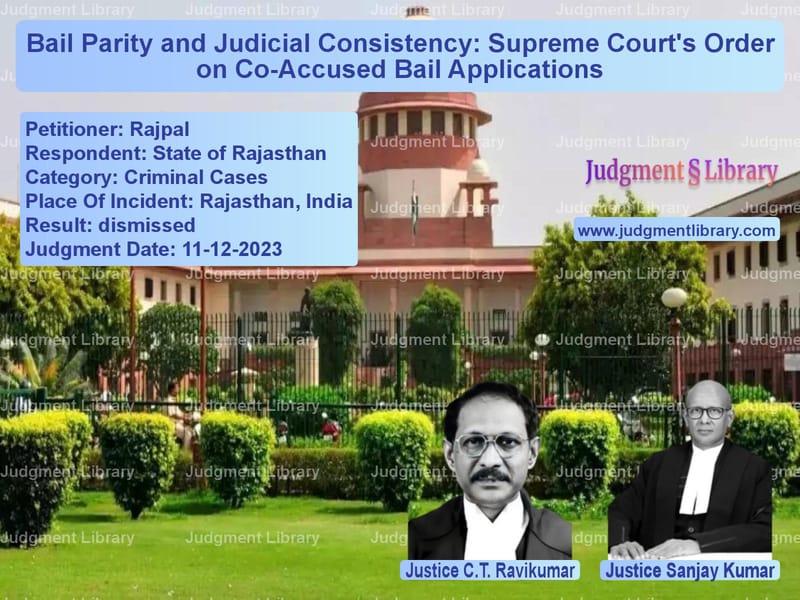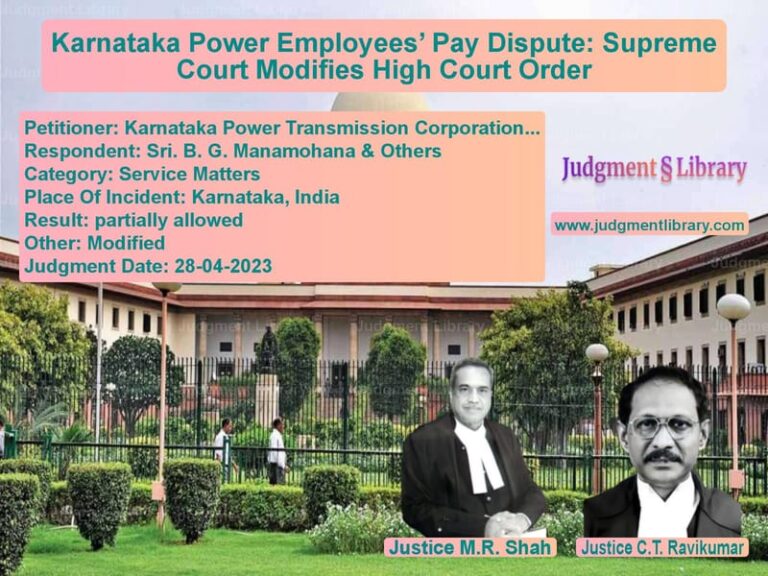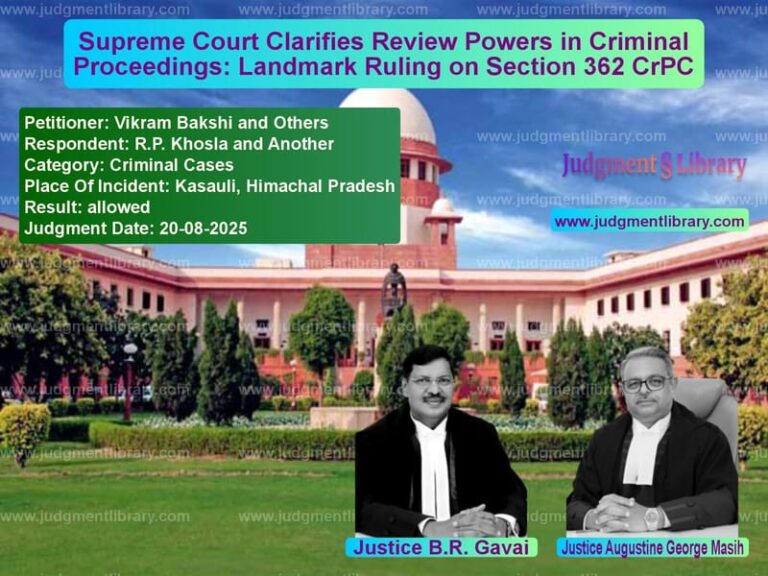Bail Parity and Judicial Consistency: Supreme Court’s Order on Co-Accused Bail Applications
The Supreme Court of India, in its order dated December 12, 2023, addressed an important issue regarding judicial consistency and parity in bail applications. The case arose from a Special Leave Petition (SLP) filed by Rajpal, a petitioner challenging the rejection of his bail application, while his co-accused in a similar case was granted bail by a different Bench of the High Court of Rajasthan. The main legal issue revolved around the claim of parity in bail applications for co-accused persons who are involved in the same FIR and facing similar charges.
The petitioner’s argument centered on the principle of judicial consistency, asserting that the denial of bail to him, while his co-accused was granted bail, violated the principle of parity. The case raised significant concerns about the practice of different judges handling matters arising from the same FIR, leading to conflicting decisions. The Supreme Court took a keen interest in this matter, reiterating the need for consistency in judicial decisions and ensuring that similar cases are handled by the same Bench to avoid discrepancies.
Petitioner’s Arguments
The petitioner, Rajpal, presented the following arguments in his appeal:
- The petitioner argued that his co-accused, who was involved in the same FIR, had been granted bail by a Coordinate Bench of the High Court of Rajasthan. However, his own application for bail was rejected by another Bench, leading to an inconsistent judicial decision in cases arising from the same FIR.
- He contended that the principle of parity should apply, meaning that if one co-accused is granted bail under similar circumstances, the other co-accused should also be entitled to bail unless there are significant differences in their cases.
- The petitioner argued that the rejection of his bail application without sufficient consideration of the circumstances, especially given that his co-accused was granted bail, violated the fundamental principle of fairness and equal treatment before the law.
- The petitioner also referred to previous judgments, such as the 2023 case of Narcotics Control Bureau v. Mohit Aggarwal, where the Court had emphasized that judicial consistency is crucial in ensuring fairness in bail decisions.
Respondent’s Arguments
The respondent, State of Rajasthan, countered the petitioner’s claim of parity and judicial inconsistency by presenting the following arguments:
- The State argued that each bail application should be decided on the facts and merits of the individual case. The role attributed to the petitioner in the commission of the offense was not the same as that of the co-accused, and thus, the two cases were not identical.
- It was contended that the decision of the Coordinate Bench to grant bail to the co-accused was based on the specific circumstances of that case, including the role of the co-accused in the offense, which was different from that of the petitioner.
- The respondent emphasized that while the principle of parity is important, it is not an absolute rule, and each bail application must be assessed on its individual facts and circumstances.
- The respondent further stated that the appellant’s claim of judicial inconsistency did not warrant intervention, as the decisions of the High Court were within their discretion and based on the case-specific facts.
Supreme Court’s Observations
The Supreme Court, in its ruling, examined the issue of parity in bail applications and judicial consistency. The Court made the following key observations:
- The Court acknowledged the petitioner’s argument that there was a discrepancy in the handling of bail applications by different Benches of the same High Court. It noted that such conflicting decisions could create confusion and undermine the principles of fairness and equality before the law.
- However, the Court emphasized that the principle of parity in bail applications is not absolute. It acknowledged that each case must be decided on its own facts and circumstances, and judicial discretion must be exercised accordingly. It recognized that the roles of the co-accused may differ, and this could impact the decision to grant bail.
- The Court referred to the order in Narcotics Control Bureau v. Mohit Aggarwal (2022), where it was held that judicial consistency in similar matters is essential, but it is not a rigid rule that applies without exceptions.
- The Court also pointed out that the issue of judicial consistency had been raised previously in cases where matters arising from the same FIR were placed before different judges, leading to inconsistent outcomes. It highlighted the need for coordination between different Benches to ensure consistency in decisions.
Final Judgment
The Supreme Court, after considering the arguments, made the following order:
- The Court allowed the withdrawal of the Special Leave Petition, stating that there was no need to delve further into the matter. However, the Court made an important observation regarding the recurring issue of conflicting bail decisions in cases arising from the same FIR.
- The Court directed that such cases should be placed before the same judge or Bench to ensure consistency in decisions. It issued a directive for the Registrar (Judicial) to communicate this order, along with the order in SLP (Crl.) No. 7203 of 2023, to the Registrars of all High Courts.
- In its concluding remarks, the Court stressed that the principle of parity in bail applications should be applied judiciously, but it must be based on the facts of each case. The mere fact that one co-accused was granted bail does not automatically entitle the other co-accused to the same treatment.
- The Court also reiterated that its observations should not be construed as establishing an absolute entitlement to bail for co-accused in similar cases. Judicial discretion must be exercised based on the facts and circumstances of each case.
Conclusion
This judgment highlights the importance of consistency in judicial decisions, particularly in cases involving bail applications for co-accused persons. While the principle of parity is important, it is not absolute, and each case must be decided on its own merits. The Supreme Court’s directive to ensure that cases arising from the same FIR are heard by the same Bench is a significant step in promoting judicial consistency. This ruling reinforces the idea that fairness in the legal process is paramount and that conflicting decisions should be avoided to maintain public confidence in the judicial system.
Petitioner Name: Rajpal.Respondent Name: State of Rajasthan.Judgment By: Justice C.T. Ravikumar, Justice Sanjay Kumar.Place Of Incident: Rajasthan, India.Judgment Date: 11-12-2023.
Don’t miss out on the full details! Download the complete judgment in PDF format below and gain valuable insights instantly!
Download Judgment: rajpal-vs-state-of-rajasthan-supreme-court-of-india-judgment-dated-11-12-2023.pdf
Directly Download Judgment: Directly download this Judgment
See all petitions in Bail and Anticipatory Bail
See all petitions in SC/ST Act Case
See all petitions in Money Laundering Cases
See all petitions in Judgment by C.T. Ravikumar
See all petitions in Judgment by Sanjay Kumar
See all petitions in dismissed
See all petitions in supreme court of India judgments December 2023
See all petitions in 2023 judgments
See all posts in Criminal Cases Category
See all allowed petitions in Criminal Cases Category
See all Dismissed petitions in Criminal Cases Category
See all partially allowed petitions in Criminal Cases Category







